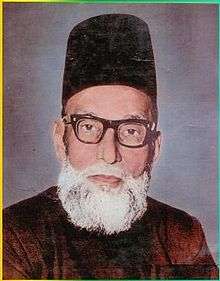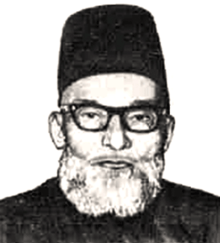Muhammad Ismail
| Qaede-Millat Muhammad Ismail | |
|---|---|
 | |
| Member of the Madras State Legislative Assembly | |
|
In office 1946–1952 | |
| Member of the Indian Constituent Assembly | |
|
In office 1946–1952 | |
| Member of the Rajya Sabha | |
|
In office 1952–1958 | |
| Member of the Lok Sabha | |
|
In office 1962–1972 | |
| Constituency | Manjeri |
| Personal details | |
| Born |
5 June 1896 Tirunelveli, Tamil Nadu |
| Died |
4 April 1972 (aged 75) Chennai, India |
| Political party |
Muslim League (till 1947) Indian Union Muslim League |
| Spouse(s) | Jamal Hameeda Bi |
| Children | Jamal Miakhan (son) |
| Residence | Chennai, India |
| Religion | ISLAM |
Muhammad Ismail (Tamil: முகமது இஸ்மாயில்) (1896–1972) was an Indian politician belonging to the Indian Union Muslim League. He was a member of the Tamil Nadu Legislative Assembly, and a member of the Indian Parliament - both Rajya Sabha and Lok Sabha. He was also a member of the Indian Constituent Assembly which framed the Indian Constitution. He is popularly known in his native states of Tamil Nadu and Kerala by the title "Quaid-e-Millat" (Leader of the Nation).
Early life
Muhammad Ismail was born in Pettai, Tirunelveli, Tamil Nadu on 5 June 1896 to Moulvi K. T. Miakhan Rowther. He obtained his education from CMS College and MDT Hindu College at Tirunelveli and later at St. Joseph's College, Trichy and Madras Christian College. He married Jamal Hameeda Bi in November 1923. He became a business man and was involved in various commerce committees throughout his political career.[1]

Political career
Muhammad Ismail started the Young Muslim Society in Tirunelveli Petai in 1909. He was instrumental in establishing Majlis-ul-Ulama (Council of Islamic Scholars) in 1918. He became a member of the Muslim league rose through its ranks. In 1945, he became the president of the Madras Presidency unit of the Muslim league. He led the Madras State Muslim League in the 1946 Assembly elections, when the league won 28 seats (all the seats reserved for Muslims in the Presidency). The league emerged as the second largest party in the assembly after the Indian National Congress. Ismail became the leader of the opposition in the Legislative Assembly during 1946-52. When the provincial assemblies elected members to serve in the Indian Constituent Assembly which also doubled as the first Parliament of independent India, Ismail was elected to the Constituent Assembly from Madras Presidency.[1][2][3][4]
When India was partitioned and Pakistan was born in August 1947, the Muslim League also split into Indian and Pakistani sections. The Indian members of the League who did not migrate to Pakistan, formed the Indian Union Muslim League (IUML). Ismail became its first president.[5] In 1952, he was elected to the Upper house of the Indian Parliament - the Rajya Sabha and remained a member till 1958. He was the first Member of Parliament (M.P) to request that part of his emolument as an M.P., be retained for National Defence Fund. He was the first leader to pronounce in the Constituent Assembly to make Tamil as a common language in the country because of its rich history and literature.[6] While in Rajya Sabha he supported the retaining of Sharia law for Indian Muslims.[1][7] When the state of Kerala was formed by the States Reorganisation Act in 1956, Ismail shifted to Kerala politics. He was elected to the Lok Sabha from Manjeri Parliamentary Constituency three times - in 1962, 67 and 71 as an IUML candidate.[1][8]
One of his great noble qualities is that while sticking to his political views firmly, he never wounded the sentiments of others by words or deeds. His straight forwardness and adherence to high moral values earned him a title 'Ganniyathirkuriya' meaning most dignified and honoured from the members of all communities in Tamil Nadu. M. Bhaktavatsalam a former Chief Minister of Tamil Nadu hailed Mr. Ismail as the model for all the leaders of opposition. He was one among a very few members who took active part in drafting the constitution of India along with B. R. Ambedkar, Vallabhbhai Patel and others.
Whenever China or Pakistan invaded India, he echoed the patriotic feelings of the Indian Muslims by his categorical declarations and offered to enlist his only son J.M. Miakhan to Army to defend the motherland. The speeches made by him in the Parliament reveal his patriotic passion, his immense faith in national unity, his deep concern to safeguard the dignity of the nation and his unflinching loyalty to the cause of communal harmony. During the period of independence, his presence and active participation was instrumental in maintaining communal harmony in South India. Sir Archibold Nye the then Governor of Madras and Dr Prakasam, the former Premier of Madras, among others, credited Ismail for the peace and communal harmony prevailed in the southern parts of India.
Business career
Muhammad Ismail was a noted businessman of the Madras Presidency involved in leather goods and meat industry. He was an office bearer in various Commerce and business organizations of the Presidency and Government committees dealing with commerce. The organizations he was a member of include: Madras Port Trust Board, Madras Board of Industries, Madras Provincial Marketing Board, Madras Excise Licensing Board, The South India Railway Advisory Committee, Indian Council of Agricultural Research (Hides and Skins Section), Hides Cess Enquiry Committee, Mica Enquiry Committee, Industrial Planning Committee (Government of Madras), South India Chamber of Commerce and Industry, Federation of Indian Chambers of Commerce and Industry. He also served as the Chairman of Leather and Leather Goods Committee of the Government of Madras and Vice-President of the Southern India Skin and Hide Merchants Association, Madras. He was the president of Madras State Mutton Dealers Chamber since 1946 till his death in 1972.[1]
Death and legacy
Ismail died in 1972.[9] The Tamil Nadu Government renamed Nagapattinam district as "Nagai Quaid -E- Millet" District in his honour.[10] (However, it reverted to its old name in 1997, when all names of persons were dropped from the names of districts and transport corporations).[11] In 2003, the Tamil Nadu Government constructed a memorial hall for Ismail.[12] A number of colleges in Tamil Nadu including the Quaid-e-Millath Government College for Women, Chennai and Quaid-e-Milleth College, Medavakkam, Chennai have been named after him.[13][14]
References
- 1 2 3 4 5 Members Profile (fifth lok sabha) Muhammad Ismail
- ↑ Ralhan, Om Prakash (1045). Encyclopaedia Of Political Parties, Volumes 33-50. Anmol Publications. p. 13. ISBN 81-7488-865-9, ISBN 978-81-7488-865-5.
- ↑ Dash, Shreeram Chandra (1968). The Constitution of India; a comparative study. Chaitanya Pub. House. p. 532.
- ↑ Saroja Sundararajan (1989). March to freedom in Madras Presidency, 1916-1947. Madras : Lalitha Publications. pp. 623–636.
- ↑ Chitkara, M. G (1996). Mohajir's Pakistan. APH Publishing. p. 2. ISBN 8170247462, ISBN 978-81-7024-746-3.
- ↑ Quaide Milleth Mohamed Ismail Sahib, a brief sketch
- ↑ Tamil Nadu Muslim League - History
- ↑ CNN-IBN Candidate Profile for Muhammad Ismail Sahib
- ↑ Lok Sabha debates. Lok Sabha Secretariat. 1972. p. 274.
- ↑ Discussion under Rule 193 Flood situation caused - Parliament of India
- ↑ Name Of The Game Outlook Magazine, 16 July 1997
- ↑ Opening ceremony of "Kanniya Thendral" Quaid-E-Milleth Mohamed Ismayil Manimandapam.
- ↑ About Us:Quaid–E–Millath Government College for Women
- ↑ University of Madras, Aided Colleges